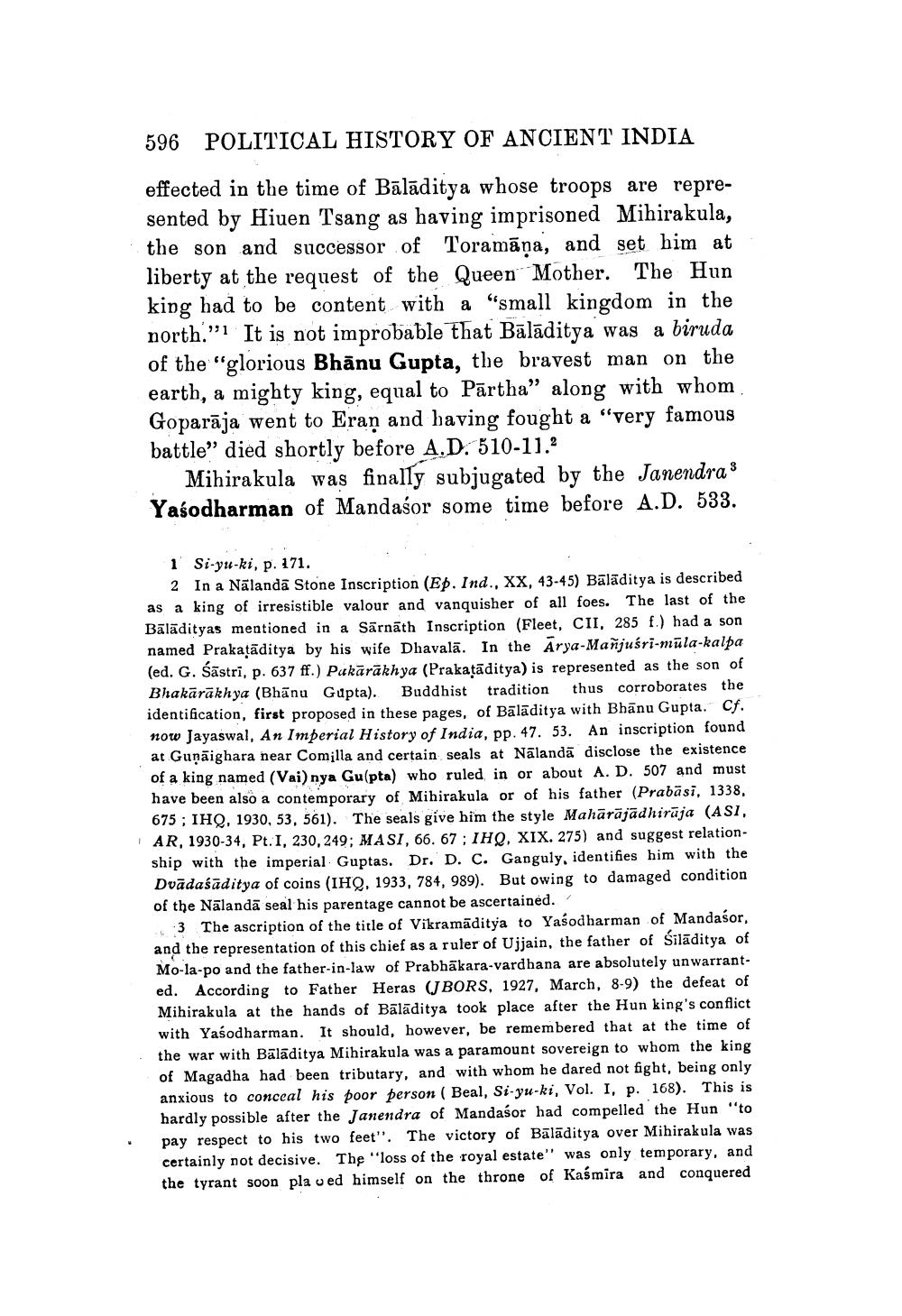________________
596 POLITICAL HISTORY OF ANCIENT INDIA effected in the time of Bālāditya whose troops are represented by Hiuen Tsang as having imprisoned Mihirakula, the son and successor of Toramāņa, and set him at liberty at the request of the Queen Mother. The Hun king had to be content with a small kingdom in the north.” It is not improbable that Bālāditya was a biruda of the "glorious Bhānu Gupta, the bravest man on the earth, a mighty king, equal to Pārtha” along with whom Goparāja went to Eran and having fought a "very famous battle” died shortly before A.D. 510-11.
Mihirakula was finally subjugated by the Janendras Yasodharman of Mandaśor some time before A.D. 533.
1 Si-yu-ki, p. 171.
2 In a Nālanda Stone Inscription (Ep. Ind., XX, 43-45) Balāditya is described as a king of irresistible valour and vanquisher of all foes. The last of the Bālādityas mentioned in a Sārnāth Inscription (Fleet, CII, 285 f.) had a son named Prakatāditya by his wife Dhavalā. In the Arya-Manjusri-müla-kalba (ed. G. Šāstri, p. 637 ff.) Pakārākhya (Prakațāditya) is represented as the son of Bhakārākhya (Bhānu Gupta). Buddhist tradition thus corroborates the identification, first proposed in these pages, of Balāditya with Bhānu Gupta. cf. now Jayaswal, An Imperial History of India, pp. 47. 53. An inscription found at Gunāighara near Comilla and certain seals at Nalanda disclose the existence of a king named (Vai) nya Gu(pta) who ruled in or about A. D. 507 and must have been also a contemporary of Mihirakula or of his father (Prabāsi, 1338,
675 ; IHO, 1930, 53, 561). The seals give him the style Mahārājadhiraja (ASI, | AR, 1930-34, Pt. I, 230, 249; MASI, 66. 67 ; IHQ, XIX. 275) and suggest relationship with the imperial Guptas. Dr. D. C. Ganguly, identifies him with the Dvādaśāditya of coins (IHQ, 1933, 784, 989). But owing to damaged condition of the Nālandā seal his parentage cannot be ascertained.
3 The ascription of the title of Vikramaditya to Yasodharman of Mandasor, and the representation of this chief as a ruler of Ujjain, the father of silāditya of Mo-la-po and the father-in-law of Prabhākara-vardhana are absolutely unwarranted. According to Father Heras (J BORS, 1927. March, 8-9) the defeat of Mihirakula at the hands of Baladitya took place after the Hun king's conflict with Yaśodharman. It should, however, be remembered that at the time of the war with Baladitya Mihirakula was a paramount sovereign to whom the king of Magadha had been tributary, and with whom he dared not fight, being only anxious to conceal his poor person ( Beal, Si-yu-ki, Vol. I, p. 168). This is hardly possible after the Janendra of Mandaśor had compelled the Hun "to pay respect to his two feet". The victory of Bālāditya over Mihirakula was certainly not decisive. The loss of the royal estate" was only temporary, and the tyrant soon pla w ed himself on the throne of Kaśmira and conquered




